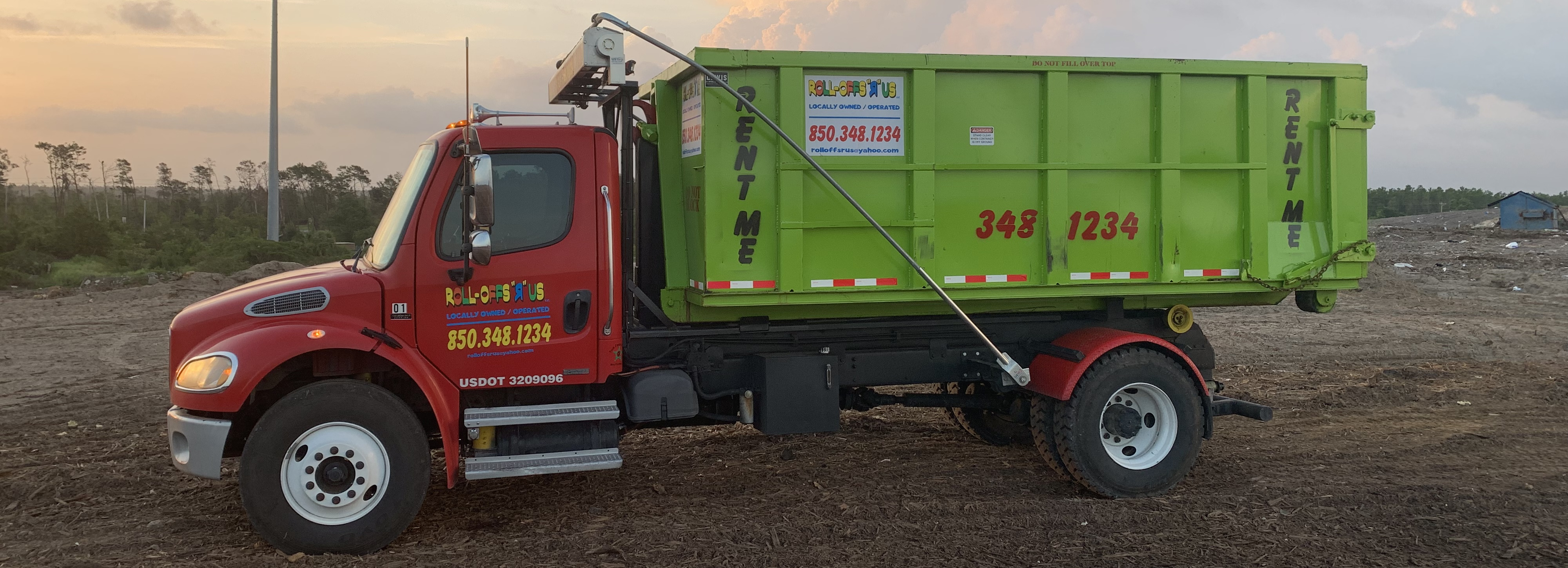Frequently Asked Questions - Services
Questions about services offered from Roll Offs R Us
Municipal Solid Waste means any solid waste derived from households, including garbage and trash, and means solid waste from single-family and multifamily residences, hotels and motels, bunkhouses, campgrounds, picnic grounds, and day-use recreation areas. The term includes yard trimmings and commercial solid waste, but does not include solid waste from mining, agricultural, or silvicultural operations or industrial processes or operations.
There are restrictions to what can be placed in your dumpster. Below are the details regarding permissible and impermissible waste.
PERMISSIBLE WASTE
While Company’s containers are in Customer’s possession, Customer shall only be permitted to place or allow to be placed only one of the following as Permissible Waste in Company’s containers:
-
Construction/Demolition Waste means waste building materials and rubble resulting from construction, remodeling, repair, and demolition operations on pavements, houses, commercial buildings and other structures. Such waste include, but are not limited to, wood, bricks, metal, concrete, wall board, paper, cardboard, inert waste landfill material, and other non-putrescible wastes which have a low potential for groundwater contamination. Construction/demolition waste does not include asbestos containing materials.
-
Municipal Solid Waste means any solid waste derived from households, including garbage and trash, and means solid waste from single-family and multifamily residences, hotels and motels, bunkhouses, campgrounds, picnic grounds, and day-use recreation areas. The term includes yard trimmings and commercial solid waste, but does not include solid waste from mining, agricultural, or silvicultural operations or industrial processes or operations.
-
Organic and Brush Waste means leaves, brush, grass, clippings, shrub and tree prunings, discarded Christmas trees, nursery and greenhouse vegetative residuals, and vegetative matter resulting from landscaping development and maintenance other than mining, agricultural, and silvacultural operations.
-
Concrete and Heavy Duty Scrap means waste that is predominantly concrete, rubble, bricks, metal scrap, and/or other dense materials.
-
Regular and Commercial Tires
-
Roof shingles
IMPERMISSIBLE WASTE
While Company’s dumpsters are in Customer’s possession, Customer shall NOT place or allow to be placed Impermissible Waste, including but not limited to, any of the following kinds of waste:
-
Biomedical Waste: Biomedical Waste means any solid waste which contains pathological waste, biological waste, cultures, and stocks of infectious agents and associated biologicals, contaminated animal carcasses (body parts, their bedding, and other waste from such animals), chemotherapy waste, discarded medical equipment and parts, not including expendable supplies and materials, which have not been decontaminated.
-
Hazardous Waste: Hazardous Waste means any solid waste which has been defined as hazardous waste in regulations promulgated by the Board of Natural Resources, Chapter 391-3-11.
-
Industrial Waste: Industrial Waste means solid waste generated by manufacturing or industrial processes that is not a hazardous waste regulated under the Hazardous Waste Management Act and regulations promulgated by the Board of Natural Resources, Chapter 391-3-11. Such waste includes, but is not limited to, wastes resulting from the following manufacturing processes: Electric power generation; fertilizer/agricultural chemicals; food and related products/by-products; inorganic chemicals; iron and steel manufacturing; leather and leather products; nonferrous metals manufacturing/foundries; plastics and resins manufacturing; pulp and paper industry; rubber and miscellaneous plastic products; stone, glass, clay, and concrete products; textile manufacturing; transportation equipment; and water treatment.
-
Sludge: Sludge means and solid, semi-solid, or liquid waste generated from a municipal, commercial, or industrial wastewater treatment plant, water supply treatment plant, or air pollution control facility exclusive of the treated effluent from a wastewater treatment plant.
-
Other Impermissible Materials means railroad ties, liquid waste, materials containing free flowing liquid, lead acid batteries, asbestos, paint, radioactive waste, pesticide, pesticide residue or similar deleterious materials possessing the capability to contaminate soil, water, or air which could create a threat to human health and the environment during pre-processing, processing, or post-processing.





